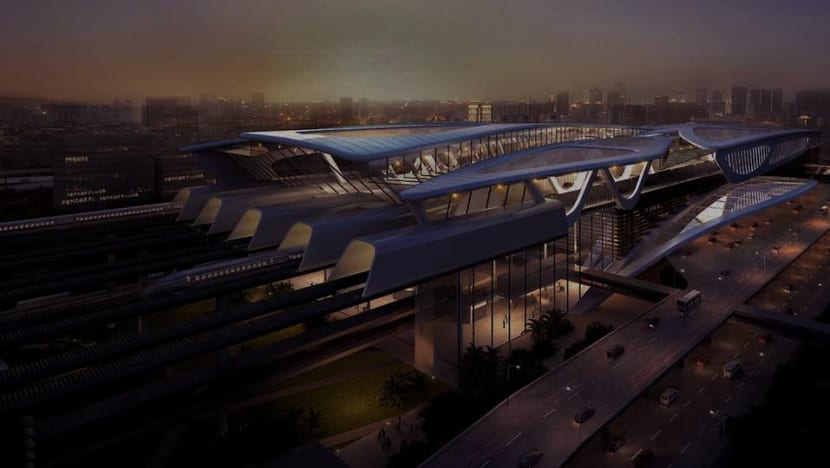Talks on reviving KL-Singapore HSR project still in early stages, matters on reducing costs have not surfaced: Malaysian minister

Concept design for a station along the KL-Singapore HSR. (Photo: MyHSR)
KUALA LUMPUR: Discussions between Malaysia and Singapore on the possibility of reviving the terminated Kuala Lumpur-Singapore High-Speed Rail (HSR) project are still in the early stages and the matter of reducing its costs have not been raised yet, said Minister in the Prime Minister's Department (Economy) Mustapa Mohamed.
Mr Mustapa was responding to a question from opposition Bagan MP Lim Guan Eng in parliament on Thursday (Dec 9).
Mr Lim, who is secretary-general of the Democratic Action Party, asked if the federal government would be replacing a previously proposed HSR project from Johor Bahru to Kuala Lumpur by reviving discussions for the KL-Singapore HSR.
He also asked what were the estimated costs for both the KL-Johor and KL-Singapore proposals and if discussions with Singapore will ensure that the original costs of RM100 billion (US$23.77 billion) can be reduced to RM50 billion.
In his reply, Mr Mustapa said: “I would like to stress that discussions on the possibility of reviving the HSR project are still in the early stages, and that the question (by Lim) on whether costs may be reduced to RM50 billion, have not yet been surfaced.”
On Nov 29, after a meeting with his Malaysian counterpart Ismail Sabri Yaakob, Singapore Prime Minister Lee Hsien Loong said that Malaysia has suggested reviving discussions on the terminated Kuala Lumpur-Singapore HSR project.
Mr Lee said that Singapore and Malaysia had previously reached an agreement to terminate the HSR project, and this has been amicably settled and closed.
“Nevertheless, Singapore is open to fresh proposals from Malaysia on the HSR project," said Mr Lee.
The HSR project, which aimed to reduce travel time between Singapore and Kuala Lumpur to about 90 minutes, was discontinued after the agreement lapsed on Dec 31, 2020.
In September 2018, both sides agreed to postpone the construction of the HSR until end-May 2020, after Malaysia under then-prime minister Mahathir Mohamad said he had considered Malaysia's financial situation and how it would not benefit from the project.
Malaysia later requested a further seven-month extension to allow both sides to discuss and assess Malaysia’s proposed changes to the project.
But both sides could not agree on new terms, including Malaysia's request to remove an assets company that would run the railway, and to let the agreement lapse.
Malaysia paid more than S$102 million in compensation to Singapore for the terminated project.
Since the termination of the agreement, Malaysia’s federal government conducted research to study the viability of a domestic HSR project between Iskandar Puteri in Johor and Kuala Lumpur.
In his parliamentary reply on Thursday, Mr Mustapa said the federal government has completed its research on this proposed domestic HSR project and will present its findings to the Cabinet.
Mr Lim then pressed on why the government will not abandon the KL-Johor HSR proposal for the Kuala Lumpur-Singapore HSR, which he thinks is more “feasible and viable”.
Mr Mustapa said: “The government maintains that the (domestic HSR) project is important to enhance connectivity between Kuala Lumpur and Johor Bahru, and one day Singapore. Singapore is a country close to Malaysia.”
To an additional question on which lines would bring more economic spillover effects, Mr Mustapa said a study has been conducted to ascertain the viability of the KL-JB line.
He said the findings of the study will be tabled to the Cabinet for discussion.
Mr Mustapa said that one obstacle in implementing the KL-Singapore HSR was Singapore’s insistence on keeping the jointly-tendered asset company AssetsCo in all agreements.
He said Malaysia, however, feels that it needs other alternatives in managing the project so as to reduce its costs.
In January, Singapore’s then Transport Minister Ong Ye Kung said that Malaysia’s suggestion to remove this assets company was the “main concern” that led to the termination of KL-Singapore HSR.
The assets company would have been necessary to ensure the interests of both countries were protected and minimise the possibility of future disputes over the HSR, said Mr Ong.
He noted that neither Malaysia nor Singapore had experience in running a high-speed rail line and so it had been agreed that a "best-in-class industry player" would be appointed to act as an assets company through an "open and transparent international tender".
This company would have supplied the train system as well as operated the network, and would have been accountable to both countries.













